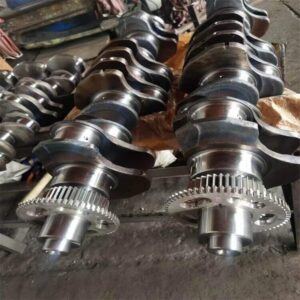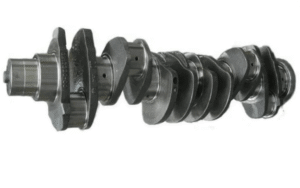die-forged steel crankshaft
die-forged steel crankshaft
In the world of high-stakes engineering, where reliability and performance are non-negotiable, the crankshaft stands as the heart of an engine. Among the various manufacturing methods, die-forged steel crankshafts represent the pinnacle of strength, durability, and precision. But what exactly are they, and why are they the preferred choice for demanding applications?

What is a Steel Crankshaft?
A steel crankshaft is a critical engine component that converts the linear, up-and-down motion of the pistons into rotational force (torque) that powers the vehicle or machinery. It is a complex-shaped part with several crankpins and journals, and it must withstand immense cyclical stresses, torsional loads, and bending moments without failing. Steel, known for its excellent strength-to-weight ratio and fatigue resistance, is the ideal material for this demanding role.
Primary Applications of Die-Forged Steel Crankshafts
Due to their superior mechanical properties, die-forged steel crankshafts are essential in applications where failure is not an option. These include:
High-Performance Automotive Engines: Racing cars, sports cars, and heavy-duty trucks.
Heavy-Duty Diesel Engines: For construction equipment, mining trucks, agricultural machinery, and marine vessels.
Aviation and Aerospace: Piston engines for small aircraft and auxiliary power units.
Industrial Machinery: Large compressors, generators, and pumps.
Motorsports: Motorcycle, ATV, and snowmobile engines built for extreme conditions.

Key Advantages of Die-Forged Steel Crankshafts Over Cast Crankshafts
Why choose forging over casting? The die-forging process fundamentally improves the metal’s internal structure, leading to significant benefits:
Superior Strength and Durability: The forging process aligns the steel’s grain flow to follow the contours of the crankshaft. This creates a continuous, unbroken grain structure, resulting in exceptional impact toughness and fatigue resistance—far exceeding that of cast crankshafts, which can have porous, inconsistent internal structures.
Enhanced Reliability: With fewer internal defects like gas pockets or inclusions, die-forged crankshafts offer unparalleled reliability and a longer service life, even under the most extreme operating conditions.
Better Weight-to-Strength Ratio: Forging allows for a more compact and optimized design, providing immense strength without unnecessary bulk, which is crucial for high-revving engines.
Improved Microstructure: The hot forging process refines the steel’s grain size, resulting in a finer, more uniform microstructure that is inherently stronger and more resistant to wear and crack propagation.
The Die-Forged Steel Crankshaft Manufacturing Process
The creation of a premium die-forged crankshaft is a precise, multi-stage operation:
Billet Cutting: A high-quality steel bar (typically carbon or alloy steel) is cut to a specific weight.
Heating: The steel billet is heated to a precise high temperature in a furnace to make it malleable.
Die Forging: The heated billet is placed between two precision-engineered dies and subjected to immense pressure from a forging press. The force shapes the billet into the rough form of a crankshaft, complete with counterweights and throws.
Trimming & Punching: Excess material (flash) is trimmed away, and holes are punched if necessary.
Heat Treatment: The forged crankshaft undergoes controlled heating and cooling processes (such as quenching and tempering) to achieve the desired hardness, strength, and toughness throughout the part.
Machining: The crankshaft is precision-machined on CNC equipment. This includes turning the main journals and crankpins to exact tolerances, drilling oil passages, and balancing.
Surface Hardening (Optional): Critical areas like journals may undergo processes like induction hardening or nitriding to further increase surface hardness and wear resistance.
Final Inspection & Balancing: The finished crankshaft is meticulously inspected for dimensional accuracy and dynamically balanced to ensure smooth operation at high speeds.
Our Custom Die-Forging Capabilities
We are a specialized manufacturer dedicated to producing top-tier die-forged crankshafts tailored to your exact needs.
Various Carbon Steel Materials: We forge crankshafts from a wide range of carbon and alloy steels to meet different performance and budgetary requirements.
Precision Heat Treatment: Our in-house heat treatment facilities allow us to enhance the hardness and overall mechanical properties of your crankshaft, ensuring it can handle your specific application’s demands.
Full Machining Services: We offer complete machining capabilities, delivering a ready-to-install, precision-ground crankshaft that meets or exceeds OEM specifications.
Custom OEM Manufacturing: We work directly from your drawings and specifications. Whether you need a prototype or a production run, we can manufacture a die-forged steel crankshaft that is perfectly customized for your engine design.
Contact us today to discuss your project requirements and experience the difference that a high-quality, custom die-forged steel crankshaft can make.
